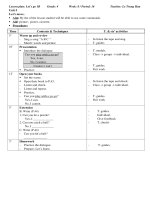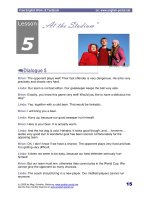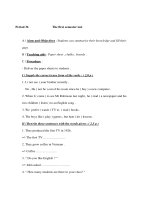New Head Way - Unit 5: One the move doc
Bạn đang xem bản rút gọn của tài liệu. Xem và tải ngay bản đầy đủ của tài liệu tại đây (3.09 MB, 69 trang )
Aims and objectives of the
lesson
1. Aims
•
Help students revise the use, the
meaning and the forms of future
tenses ( will, going to, present
continuous)
2. Objectives
•
By the end of the lesson students
will be able to use different future
forms , structures of the future
forms.
•
By the end of the lesson students will
be able to distinguish the difference
between the use of these future
tenses.
By the end of the lesson students will
be able :
•
to do all the practice exercises
•
read the texts fluently
•
translate the texts into Vietnamese
and answer all the questions
•
do all listening exercises
Aims and objectives of the
lesson
PREPARED
QUESTIONS
1. What English future tenses have
you learnt? What question forms
do you know?
2. What is the form and the use of
the simple future, near future
and present continuous for the
future meaning
ANSWER
What tenses have you learnt?
•
The near future tense
•
The simple future tense
•
The present continuous tense
Form
Positive and negative
Question
What time
will you
are you going to
arrive?
Are you meeting the manager?
Note that we avoid saying going to come or going to go.
We’re coming tomorrow.
When are you going home?
I
He
They
I’m/I’m not
She’s/She isn’t
We’re/We aren’t
I’m/I’m not
He’s/he isn’t
You’re/You aren’t
Help you
Watch the football tonight
going to
Catching the 10.00 train
‘ll
won’t
Use
Prediction (will and going to)
Will
The most common use of will is as an auxiliary verb to show
future time.
It expresses a future fact or prediction. It is called the pure
future, or the Future Simple.
We’ll be away for two weeks.
Those flowers won’t grow under the tree. It’s too dark.
Our love will last forever.
You’ll be sick if you eat all those sweets!
Will for a prediction can be based more on an opinion than a
fact.
I think Laura will do very well in her exams. She works hard.
I am convinced that inflation will fall to 3 per cent next year.
Going to
Going to can also express a prediction, especially when it
is based on a present fact. There is evidence now that
Something is certain to happen.
She’s going to have a baby. (We can see she’s pregnant)
Liverpool are going to win the match. It's four nil, and
there’s only five minutes left)
It isn’t going to rain today. Look at that lovely blue sky)
Sometimes there is no difference between will and going to.
This government
will ruin
is going to ruin
the country with its
Stupid economic policies
Decisions and intentions (will and going to)
Will is also used as a modal auxiliary verb to express a decision,
Intention or offer made at the moment of speaking.We saw this
use in Unit 4.(See page 148)
I’ll have the steak,please.
I’ll see you tomorrow.Bye!
Give me a ring some time. we’ll go out for a drink.
‘Jeff,there’s someone at the door!’ ‘Ok,I’ll get it’
Remember that you can’t use the present tense for this use
NOT * I have the steak. * I see you tomorrow.
Going to is used to express a future plan,decision or intention,
made before the moment of speaking.
When I grow up, I’m gong to be a doctor.
Jane and Peter are going to get married after they’re graduated
We’re going to pait this room blue
Arrangements (Present Continuous)
The Present Continuous can be used to express a future
Arrangement between people.It usually refers to the near
Future.
We’re going out with Jeremy tonight.
I’m having my hair cut tomorrow.
What are we having for lunch?
Think of the things you might put in your diary to remind
you of what you are doing over the next few days and
weeks.These are the kinds of events that are often expressed
by the Present Continuous for the future.The verbs express
some kind of activity or movement.
I’m meeting Peter tonight.
The Taylors are coming for dinner.
I’m seeing the doctor in the morning.
We’re going to a party on Saturday night.
We’re catching the 10.00 train.
Remember,that you can’t use the present tense for this use.
NOT *I meet Peter tonight.
*I see the doctor in the morning.
*What do you do this evening?
Sometimes there is no difference between an agreed
Arrangement (Present Contiuous) and an intention
(going to)
married in the spring.
We’re going to get
We’re getting
COMMON MISTAKES
A * What do you do tonight?
B * I watch TV.
A * Have you decided yet?
B * Yes.We’ll go to Spain.
A *The phone’s ringing.
B *OK. I answer it.
A * When you go home?
B * I’m go home soon.
Try to stress the following:
•
Use will for future facts,and intentions or offers made at
the moment of speaking.
•
Use going to for intentions made before speaking.
•
Use the Presen Continuous for arrangements between
People.
Be vigilant in the correction of mistakes. Try asking the
class before a weekend or a holiday what they are planning
to do,and monitor their use future forms.
Test your grammar
T.32 read and listen to the joke. Underline the verb forms that
refer to the future.
What is this the difference between them?
A Penguin Joke
One day a man and his wife were walking down the street when they came
across a penguin.
‘Oh !’exclaime d the man .’What a surprise! what shall we do with it?’
‘I know’ said his wife .’We’ll ask a policeman’.So they found a policeman
and explained what had happened.
‘Mmm,’said the policeman,’I think the best thing is to take it to the zoo’
‘what a good idea!’ said the woman.’We’ll go there straight away’
The next morning the policeman was walking down the same street when
he saw the couple again with the penguin.’I thought I told you to take that
penguin to the zoo,’th policeman said.’Well,we did,’said the man.’We took
it to the zoo and we all had a really good time.So this afternoon
we’re talking it to the cinema,and this evening we’re going to have a meal
In a fish restaurant
– going to for a planened
intention
Answer
Shall
- used to express a suggestion
We’ll ask
- a decision made at the time of speaking
We’ll go
– same
We’re talking it
- present Continuous for an
arrangemet
We’re going to have
PRESENTATION (1)
going to and will
John always writes himself a list at the beginning of every
day.What’s he going to do today?What’s he going to buy?
Example
He’s going to fill up the car with petrol.
T
h
i
n
k
s
t
o
d
o
T
h
i
n
k
s
t
o
b
u
y
p
e
t
r
o
l
s
u
g
a
r
d
e
c
t
r
i
c
i
t
y
b
i
l
l
t
e
a
p
l
a
n
e
t
i
c
k
e
t
s
f
r
o
m
c
h
e
e
s
e
t
h
e
t
r
a
v
e
l
a
g
e
n
t
y
o
g
h
u
r
t
t
h
e
l
i
b
r
a
r
y
2
a
v
o
c
a
d
o
s
a
h
a
i
r
c
u
t
a
p
p
l
e
s
–
t
h
e
d
o
g
f
o
r
a
w
a
l
k
m
e
l
o
n
Answers
He’s going to fill up the car with petrol.
He’s going to pay the electricity bill.
He’s going to get / pick up the plane tickets from the
Travel agent.
He’s going to take some book back to the library / get
some book out of the librari.
He’s going to have a hair – cut.
He’s going to take the dog out for a walk.
He’s going to buy some sugar.
He’s going to buy some tea.
He’s going to buy some cheese.
He’s going to buy some yoghurt.
He’s going to buy two avocados.
He’s is going to buy some apples.
He’s going to buy a melon.
SUGGESTION
A. What’s he going to get from the travel agent ?
B. He’s going to get the plane tickets.
A. What’s going to do at the library?
B. He’s going to get out/borrow some books.
A. Where’s going to take the dog for a walk?
B. He’s going to take her to the park.
A. What’s he going to buy at the shops?
B. He’s going to buy some sugar and some cheese
T.33 Read and listen to the dialogue between
John (J) and Anna (A)
J I’m going to the shops soon.Do you want
anything?
A No, I don’t think so.Oh,hang on.We haven’t
got any sugar left.
J It’s all right .It’s on my list. I’m going to buy some.
A What about bread?We haven’t got any bread.
J Ok.I’ll go to the baker’s and I’ll buy a loaf.
A I’ll be at work when you get back.
J I’ll see you later,then.Don’t foget Jo and Anny are
coming round for a drink tonight.
A Ah,right.Bye.
J Bye,honey.
Grammar questions
I’m going to buy some (sugar).
I’m buy a loaf.
-Why does John use different future forms?
What’s the difference between will and going to to
express a future intention?
- John uses going to to express what he has Already
decided to do.
He uses will to express what he decides to do at the
moment he’s speaking.
- We don’t asually say going to go or going to come.
Find the examples in the dialogue where these froms
are avoided
-
I’m going to the shops…
Jo and Andy are coming round
PRACTICE
Dialogues
Jonh said, I’ll go to baker’s and I’ll buy a loaf.
Look at the list of items. What would Anna ask?
What woud John say?
Example
- Some stamps
Anna: Could you get some stamps?
John: Ok. I’ll go to the post office and buy some.
- A newspaper
- A bottle of wine
- A joint of beef
- A film for her camera
- Some shampoo
- A tin of white paint
- A video
- Some left – tip pens
Answers
A: Could you get anewspaper?
A: Could you get a film my camera?
A: Could you get a point of beef?
A: Could you get a bottle of wine?
A: Could you get some shapoo?
A: Could you get a tin of white paint?
A: Could you get a video?
A: Could you get some felt – tip pens?
J: Ok. I’ll go the nemsagent’s and buy one.
J: Ok. I’ll go to the off – licence and buy a bottle.
J: Ok. I’ll go the butcher’s and buy it.
J: Ok. I’ll go to the photo shop/ chemist’s and buy one.
J: Ok. I’ll go to the chemist’s and buy one.
J: Ok. I’ll go the hardware shop and buy it.
J: Ok. I’ll go the video shop and get one out.
J: Ok. I’ll go the stationer’s and get some.
Listening
T.34 Listen to the conversations. Say what’s going to happen.
Example
A: Have you seen the air tickets?
A: No. Maybe not. The taxi driver
will know.
A: And do you have the address of
hotel?
A: Yes. No milk for a fornight. Right?
B: Yes. They’re with the travellers’
cheques.
B: No. I’ve just got the name. Do
we need the address?
B: What about the milk? Have you
cancelled the milk?
B: That’s it. Well done.
They’re going to
catch a plane.
They’re going to stay
in a hotel.
They’re going to be
away for two weeks.
Answers
They’re going to get married.
They’re going to get married in a church.
They’re going to have the reception in a hotel.
They’re going to Bali for their honeymoon.
They’re going to have a party.
About twenty or thirty people are coming.
They’re going to eat caviar and drink champagne.
They’re going to dance.
They’re going to move house.
The removal men are coming at 7.00 in the morning.
They’re going to move to the country.
They’re going to have a baby.
1
2
3
I think I’ll …
Use the prompts in A to make sentences with I think
… will. Match them with a sentences in B.
Example
I think Jeremy will win the match. He’s been playing really well
recently.
A
B
a. …Jeremy/ win the match
b. …it/ be a nice day tomorrow
c. …i/ pass my exams
d. …you/ like the film
e. …we/ get to the airport in
time
f. …you/ get the job
But we’d better get a move on.
He’s been playing really well
recently.
The forecast is warm and dry.
You’ve got all the right
qualifications.
It’s lovely story, and the
acting is superb.
I’ve been revising for weeks.
e
a
c
b
d
f









